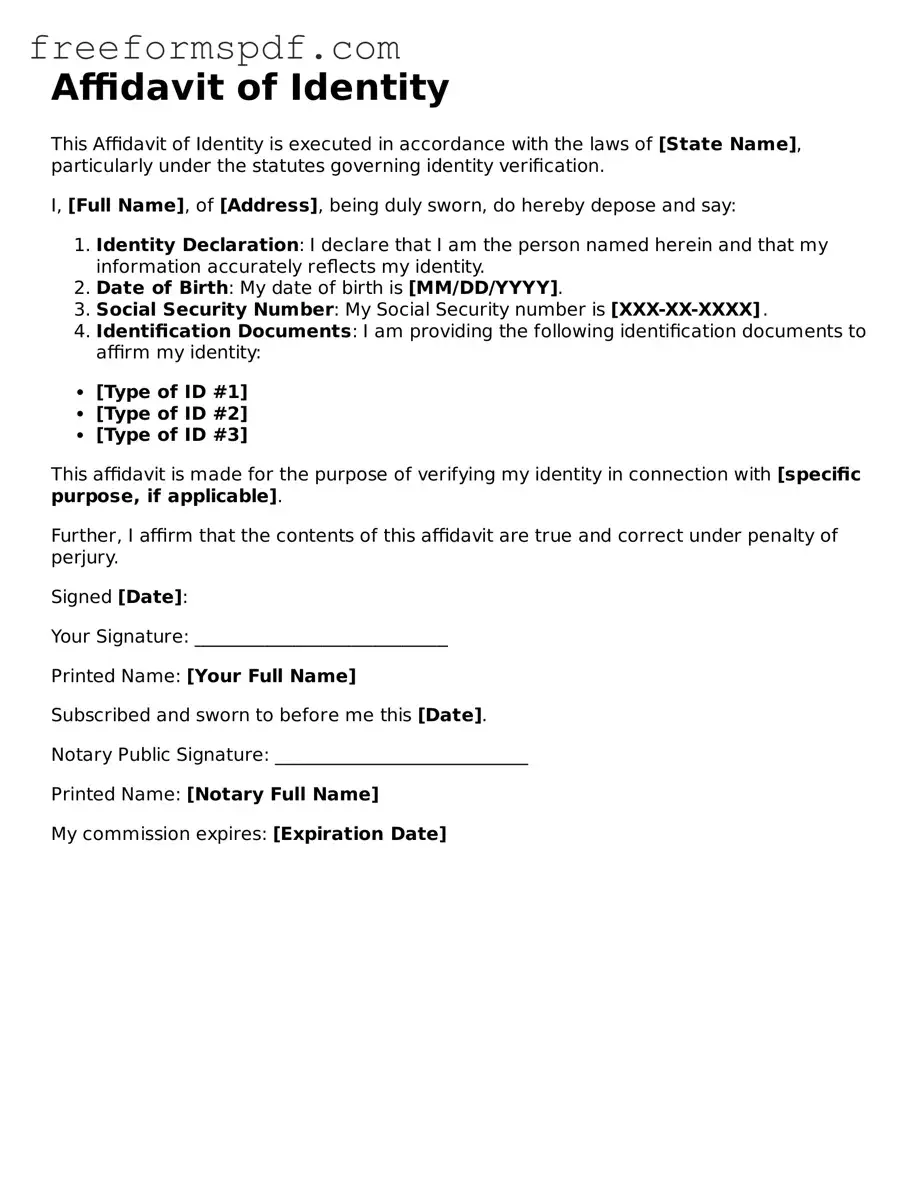Affidavit of Identity Document
Common mistakes
-
Missing Required Information: Many individuals forget to fill in all the necessary fields. This can include personal details like full name, address, and date of birth. Leaving out even one piece of information can lead to delays or rejection of the affidavit.
-
Inaccurate Information: Providing incorrect details is a common mistake. Double-checking the information is essential. Errors in names, dates, or addresses can create confusion and may require the form to be completed again.
-
Not Signing the Document: Some people overlook the importance of signing the affidavit. A signature is crucial as it verifies the authenticity of the document. Failing to sign can render the affidavit invalid.
-
Ignoring Notarization Requirements: Many individuals do not realize that the affidavit may need to be notarized. Notarization adds a layer of credibility. Without it, the affidavit may not be accepted by the intended parties.
Learn More on This Form
-
What is an Affidavit of Identity?
An Affidavit of Identity is a legal document that allows an individual to affirm their identity. This form is often used in situations where there is a need to verify personal information, such as when applying for a government-issued ID, opening a bank account, or addressing issues related to identity theft.
-
Who needs to complete an Affidavit of Identity?
Anyone who needs to confirm their identity for legal or official purposes may need to complete this form. This includes individuals who may have lost identification documents, those who have experienced identity theft, or individuals who are required to provide proof of identity for various transactions.
-
What information is required on the form?
The Affidavit of Identity typically requires personal information such as your full name, date of birth, current address, and any previous names you may have used. Additionally, you may need to provide details about the circumstances that necessitate the affidavit, as well as any identification documents you possess.
-
How is the Affidavit of Identity used?
This affidavit serves as a sworn statement affirming your identity. It may be presented to various institutions, such as banks, government agencies, or legal entities, to verify your identity when required. The affidavit can help establish your credibility and support your claims when dealing with identity-related issues.
-
Do I need to have the Affidavit of Identity notarized?
Yes, in most cases, an Affidavit of Identity must be notarized. This means that you will need to sign the document in the presence of a notary public, who will then verify your identity and witness your signature. Notarization adds an extra layer of authenticity to the affidavit.
-
What should I do if my identity has been stolen?
If you suspect that your identity has been stolen, it is crucial to take immediate action. Completing an Affidavit of Identity can be a vital step in this process. Additionally, you should report the theft to the authorities, contact your bank and credit card companies, and consider placing a fraud alert on your credit report.
-
Where can I obtain an Affidavit of Identity form?
You can typically obtain an Affidavit of Identity form from various sources, including government websites, legal aid organizations, or your attorney's office. It is essential to ensure that you are using the correct form for your specific needs, as requirements may vary by state or institution.
Misconceptions
Understanding the Affidavit of Identity form is crucial for anyone who needs to verify their identity in various legal situations. However, several misconceptions can lead to confusion. Here are six common misunderstandings:
- It is only used in court cases. Many believe the Affidavit of Identity is exclusively for court proceedings. In reality, it can be used in various situations, such as applying for loans or verifying identity for employment.
- Anyone can create an Affidavit of Identity. While it may seem simple to draft, an Affidavit of Identity must be completed correctly to be valid. It often requires specific language and formatting.
- Notarization is optional. Some people think notarization isn’t necessary for the Affidavit of Identity. However, many institutions require a notarized affidavit to ensure its authenticity.
- It only needs to be signed by the individual. Many assume that only the person whose identity is being affirmed needs to sign the document. In some cases, a witness or notary may also need to sign.
- Once submitted, it cannot be changed. There is a belief that once an Affidavit of Identity is submitted, it cannot be altered. In fact, if there are errors, a new affidavit can be created to correct them.
- It is the same as a driver's license. Some people confuse the Affidavit of Identity with a driver's license or other forms of ID. The affidavit serves a different purpose and is typically used to affirm identity in specific legal contexts.
Clearing up these misconceptions can help individuals navigate the process of using the Affidavit of Identity more effectively.
Other Types of Affidavit of Identity Forms:
How to Fix My Birth Certificate in California - Accuracy in the affidavit is crucial to ensure it serves its purpose effectively.
For those looking to establish their residency in South Dakota, it is important to familiarize oneself with the necessary legal requirements, including the Letter of Residency, which can guide you through the process of completing the Affidavit of Residency form correctly.
Single Status Certificate Usa - The form must be filled out accurately to reflect your true marital status.
